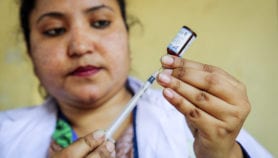By: Kimani Chege
Send to a friend
The details you provide on this page will not be used to send unsolicited email, and will not be sold to a 3rd party. See privacy policy.
[ADDIS ABABA] African ministers agreed this week to recommend that the African Union should demand US$67 billion per year from the global community in compensation for the effects of climate change.
The annual sum would be spent on establishing science-guided projects to help with adaptation and mitigation.
The figure was agreed at a meeting of the Conference of Africa Heads of States and Government on Climate Change in Addis Ababa (24 August). However, only deputy ministers attended the meeting, and it is hoped that the declaration will be endorsed by African heads of state next week in Tripoli, Libya.
The demand would then be presented at international climate talks in Copenhagen later in the year.
The figure of US$67 billion a year has been debated for some time, including at African Union (AU) summits in February and July of this year, gaining prominence at the Nairobi, Kenya, meeting of African ministers of environment earlier this year. The payments would need to be achieved by 2020, the Addis Ababa meeting agreed.
At the meeting some delegates called for the sum to be nearer US$200 billion a year, representing Africa’s share of the four per cent of global GDP which, it is argued, should be spent on adaptation and mitigation worldwide.
The conference is a group of eight countries that have been mandated to negotiate on behalf of Africa at future climate talks. It comprises Algeria, the Congo, Ethiopia, Kenya, Mauritius, Mozambique, Nigeria, Uganda, the chairpersons of the AU, the AU Commission and the African ministerial conference on the environment, along with technical negotiators from around Africa.
The AU said the meeting sought to translate a "technical voice" into "political commitment" in climate-change negotiations.
Delegates said they would like to see the money go towards establishing centres of excellence on climate change. The AU will push for compensation through technology transfer and capacity-building, rather than cash.
The AU’s director of rural economy and agriculture, Abebe Haile Gabriel, said the continent was lagging behind in terms of scientific data collection, the development of mitigation projects and the training of scientists.
"The continent’s position is not that of demanding cash tokens but massive investment in ways to help the countries use technologies," he said.
The AU wants individual countries to use the money to carry out national plans of action, which mostly consist of finding ways to use efficient technologies in the energy, agriculture and water management sectors, as well as obtaining intellectual property rights for these technologies.
Judy Beaumont, the South African representative at the meeting, said that the amount required for adaptation programmes globally is more than US$400 billion and that at least half of this should go to projects in Africa.
She added that Africa needs low-carbon technologies, energy-efficiency projects and renewable-energy technologies, which have previously remained elusive because of a lack of affordable financing and difficulty in obtaining intellectual property rights.
"This is not about begging for cash but the urge for a common but differentiated responsibility,"added Beaumont. "Most developed countries took a dirty route to development, and Africa cannot take the same route."













